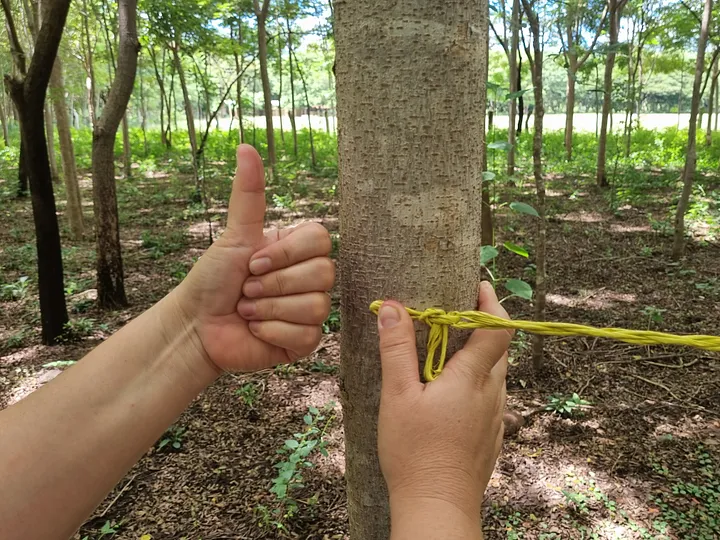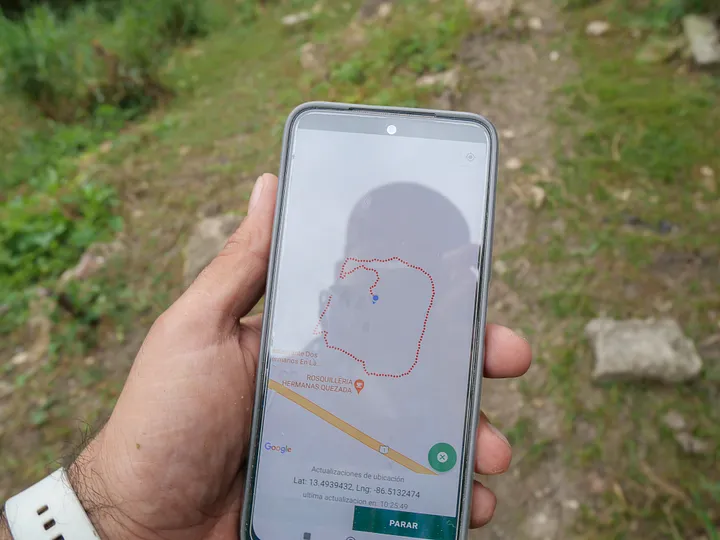Pilot Launch | Taking Root: Scaling resilient agroforestry for smallholder farmers with AI in Nicaragua
Image courtesy of Taking Root
Mercy Corps Ventures launched a pilot with Taking Root to improve forest management techniques to increase climate resilience of smallholder farmers in Nicaragua. This pilot emerged out of a pool of 318 proposals from our AI for Climate Resilience call for proposals, launched in July 2024, which is exploring how AI is being used in emerging economies to build climate resilience for the most climate-vulnerable communities. Nearly half (47%) of the applications we received centered around the potential of AI in agriculture, with many focused on providing critical insights to enhance decision-making and farm management.
Taking Root leverages AI to develop tailored forest management to improve the climate resilience of smallholder farmers in Nicaragua. Through this pilot, Taking Root will develop an AI model, building on their 15 years of experience managing forestry projects, to provide more targeted recommendations to smallholders.
This post is the first of a two-part series. The second blog will share key insights after the pilot is completed. Written by Maria Gomez, Innovation Manager at Mercy Corps Ventures and Will Sheldon, Commercial Director at Taking Root.
In brief
Mercy Corps Ventures is testing the use of AI and machine learning to build climate resilience in agriculture and agroforestry. Through our AI for Climate Resilience call for proposals, we’re supporting solutions that improve land restoration, farming practices, and farmer livelihoods in the face of increasing climate stress.
In Nicaragua, we’re partnering with Taking Root to pilot an AI-driven forest management platform that helps smallholder farmers build more resilient agroforestry systems. The solution combines field data and AI to deliver tailored, timely guidance that helps farmers maintain healthy trees and restore degraded land.
The pilot equips extension workers with tools to deliver smarter, real-time recommendations to over 5,000 farmers managing 15,000 hectares. By improving precision and timing of support, the platform helps overcome key barriers to scaling agroforestry — ensuring trees survive, ecosystems recover, and farmers thrive.
Image courtesy of Taking Root
The problem
Climate change and soil erosion are threatening farmers in Nicaragua
Farmers around the world face growing pressures to feed a rising population — expected to reach 9.8 billion by 2050 — while battling the worsening effects of climate change. Droughts, extreme heat, and erratic rainfall are already disrupting food systems, and over one-third of the world’s land is now moderately or severely degraded, making it harder to grow food sustainably.
This crisis is particularly urgent in Nicaragua. Ranked 6th in Latin America and the Caribbean on the Climate Vulnerability Index, Nicaragua faces extreme risk from climate change. Agriculture plays a vital role in the country’s economy, accounting for 16.8% of GDP and sustaining the livelihoods of 1.5 million farmers. These farmers are increasingly vulnerable to intense droughts, flooding, excessive rains, and rising temperatures.
Decades of chemical fertilizer use, and extensive livestock farming have further degraded soils, leaving them less productive and harder to restore. According to the International Center for Tropical Agriculture (CIAT), soil degradation in Nicaragua is not only undermining food production but also threatening the health and nutrition of local communities. Even more concerning, soil recovery is estimated to be four times slower than in healthier ecosystems.
For smallholder farmers, this isn’t just an environmental issue — it’s a daily threat to their crops, income and future.
A field technician in Nicaragua uses the Taking Root mobile app to conduct a forest field inventory
Agroforestry works — but it’s hard to get right
In Nicaragua, many smallholder farmers are turning to agroforestry as a strategy to restore their land and secure more stable livelihoods. With soil increasingly degraded and climate shocks more frequent, planting trees offers a pathway to both environmental recovery and economic resilience.
Agroforestry integrates trees into farming systems, helping to rebuild soil health, improve water retention, and lower surface temperatures. Trees act as windbreaks and moisture regulators, protecting farms and droughts, floods, and erosion. In doing so, they strengthen farmers’ ability to adapt to extreme weather. Beyond environmental benefits, agroforestry can also open income streams — from timber, fruit, or carbon credits — reducing dependence on subsistence crops.
But while promising, scaling agroforestry remains a major challenge.
Successfully growing trees requires long-term investment and consistent care — tasks like weeding, pruning, and thinning that are often labor-intensive and time-sensitive. Many farmers lack the technical training and ongoing support needed to maintain healthy tree systems. As a result, traditional agroforestry programs that rely on one-time planting guidance often see high tree mortality rates and limited long-term impact.
For agroforestry to truly help smallholder farmers adapt and thrive, the model must evolve. It needs to be more accessible, affordable, and tailored to the realities farmers face — backed by systems that provide continuous, adaptive support for success over time.
Measuring tree growth in Nicaragua
The pilot
Mercy Corps Ventures is partnering with Taking Root to pilot an AI-driven solution that provides smallholder farmers with tailored, timely forest management recommendations. Using a combination of AI and field data, the platform tracks the growth stages of farmers’ trees and identifies when specific management activities are needed. This ensures that farmers receive actionable advice at critical moments, while field technicians can focus their efforts on supporting those who need it the most. The pilot will help over 5,000 farmers manage 15,000 hectares of land, enabling them to build thriving, resilient agroforestry systems.
We are particularly excited to build on Taking Root’s strong track record in Nicaragua, where they have successfully restored forests and supported smallholder farmers for over 15 years. Their model has not only empowered farmers but also generated high-quality carbon credits, creating a sustainable economic incentive for forest restoration. In 2024, Taking Root’s work in Nicaragua led to the issuance of 426,912 carbon credits and over the life of the program they have paid over $40,000 to smallholder farmers. With over two million tree growth measurements and 300,000 activity logs in their database, Taking Root is uniquely positioned to use AI to scale agroforestry practices. This pilot represents an innovative approach to unlocking the full potential of agroforestry while helping farmers improve their livelihoods and build their resilience to climate change.
Target users: 75 field workers in Nicaragua, leveraging the platform to support 5,000 smallholder farmers managing 15,000 hectares of forest
A field technician in Nicaragua uses the Taking Root mobile app to conduct a forest field inventory
“Having a technology platform helps us organize and manage information in a way that’s easy to use. It’s a huge improvement compared to juggling multiple Excel files on a computer or server. It makes handling such an extensive program much more manageable.” Roberto Enrique Ponce Diaz, Technology & Data Quality, BOSNICA (on-the-ground partner in Nicaragua overseeing day-to-day operations).
“It’s incredibly helpful to be able to geo-reference plots [of land being restored] in real-time. This means that when we’re on-site, we can immediately log our reports and process the information right then and there. This eliminates the need to create separate technical reports later, which takes a lot of time. It also means that other technicians can find the plots at a later date, even under challenging conditions.” Raquel Elizabeth Briones, Field Technician, BOSNICA.
Our hypotheses
We will test three core hypotheses in this pilot:
AI-based forest management recommendations increase the success rate of climate resilient agroforestry systems grown by smallholders. Our north star is to increase the number of hectares restored by smallholders on their land, which contributes to improved environmental outcomes.
AI-based forest management recommendations enable more farmers to improve their climate resilience. Our north star is to increase farmers’ climate resilience and profits.
AI reduces the cost of supporting smallholder farmers to grow resilient agroforestry systems. Our north star is to increase the cost-efficiency of Taking Root over time through improved forest management.
We hope that by leveraging AI, Taking Root will be able to innovate its business model, reach smallholder farmers in cost-effective ways, and increase their climate resilience. Stay tuned for updates, evidence, and insights on our other Mercy Corps Ventures pilots responsibly testing technology solutions to increase the climate resilience of vulnerable populations in emerging markets.
Find more details about our all our AI-powered agriculture pilots here






